Crude Conversations
”Crude Conversations” features guests who represent a different aspect of Alaska. Follow along as host Cody Liska takes a contemporary look at what it means to be an Alaskan. Support and subscribe at www.patreon.com/crudemagazine and www.buymeacoffee.com/crudemagazine
Episodes
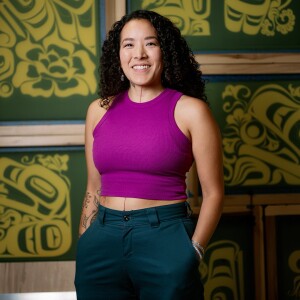
Friday Nov 18, 2022
Chatter Marks EP 50 Indigenizing public spaces with Crystal Worl
Friday Nov 18, 2022
Friday Nov 18, 2022
Crystal Worl is fresh off of two big projects. A mural in downtown Anchorage and a commission for Google. The mural depicts and applies traditional Alaska Native traditions and symbols — the formline art of the Tlingit, Haida and Tsimshian, for example. It’s 120-feet long, the largest thing she’s ever designed. The Google skin, titled “Primary Ravens,” depicts ravens, which represent the Creator and are always playing tricks. What she likes most about these pieces is that they’re public. They don’t belong to just one person, they belong to the communities that they’re made for. So, anyone has access to them. Both designs utilize traditional and modern techniques, something Crystal makes a point of combining in her work, and they’re part of a larger idea to indigenize public spaces.
Crystal says that having her murals displayed downtown is significant because that’s where people come together. It’s where locals hang out, do business, have dinner, and it’s where visitors are often introduced to Alaska. In many ways, art helps us understand a city, the land and the history of both. She says that the art of formline can help us understand the future of Alaska. It can help us visualize and plan for the future of a state that reflects our ideals and our values. Her mentor, Haida artist Robert Davidson, taught her about the power of visualization. He told her to focus on the end goal, not the process because so many things will test your strength along the way, so it’s important to be persistent. To imagine herself standing in front of the finished piece and celebrating it.
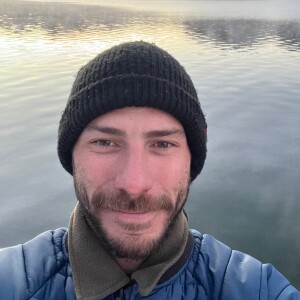
Sunday Nov 13, 2022
EP 119 Starbound with Sammy Luebke
Sunday Nov 13, 2022
Sunday Nov 13, 2022
In this one, Cody talks to professional snowboarder Sammy Luebke. Snowboarding has been part of Sammy’s life for 25 years. He grew up in it. His first board was a 111 Burton Air — it was about 3 and a half feet tall — and he rode it at Alyeska, when he and his family lived in Girdwood, Alaska in an A-frame nicknamed Twin Peaks. There, at Alyeska, was where he laid the groundwork for the rider he would later become. Confident and versatile. Then, in 1998, he and his family moved to Truckee. His parents had just split up and the move provided his family with more opportunities. It also put him in a position and a scene that would help grow his snowboard career. It wasn’t long before he met friends, kids who were also competing in the USASA competitions. They formed a crew and called themselves Starbound.
Early in his career, he focused on freestyle riding — hitting jumps and rails. In 2011, he got first part in a Standard Films video and a cover shot with Onboard Magazine. At 21, he had accomplished what so many professional snowboarders work their entire careers to achieve. Then, in 2012, he switched gears and made the decision to focus on big mountain riding. He competed in the Freeride World Tour and came in 3rd place. Every time he returned, he got closer and closer to winning. Until, in 2016, he nailed all of his lines and won the tour. He would go on to win it in 2017 and 2018 as well. Three years in a row. He says doing the competition was probably the biggest decision he’s made in snowboarding because he did it for himself. It wasn’t to appease sponsors or to make money, it was out of his love and devotion to snowboarding.
Right now, he’s at a point in his life where he’s trying to be a jack of all trades. He’s learning new skills — stuff he says he missed out on when he was younger and busy pursuing snowboarding. His plan is for these new skills to lead to work that will allow him to snowboard his own way. He’s learned a lot since Girdwood, back when so many big parties were at his house and he was surrounded by adults. He had to grow up fast. So now, he impresses on his daughters to enjoy being a kid because it doesn’t last long and adulthood, with all its responsibilities and obligations, will come soon enough.
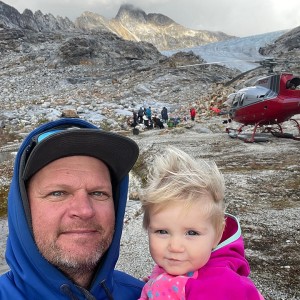
Sunday Nov 06, 2022
EP 118 Pointing it with Ashely Call
Sunday Nov 06, 2022
Sunday Nov 06, 2022
In this one, Cody talks to big mountain snowboarder Ashley Call. As a kid, he was familiar with his home mountain, Eaglecrest, because he’d be there pretty much every day from 6:30 in the morning to 6:30 in the evening. For over 20 years, his dad was the director of ski patrol. So, while he helped ready the mountain for the day, Ashley ran around the lodge and caused trouble. Until the mountain opened and the lifts started spinning. Then it was time for Ashley to ride the mountain all day long.He started snowboarding at 13. That first year, he went as fast as he could until he fell down. He had to, he was trying to keep up with the Juneau Boys, a group of riders in Juneau who were pushing the boundaries of the sport in the ‘90s and early 2000s. They rode together, traveled for competitions nationally and internationally and filmed video parts. They were a family of exceptional riders who fed off each other. So, to keep up with them, Ashley had to point it. He had to go as fast as he could. Which is something he would become known for. He would go on to have an impressive big mountain career, with wins at Verbier, Arctic Man and King of the Hill.For the last six or seven years, he’s been focused on powsurfing. Powsurfers are like snowboards, but without bindings. He says it gives him the same rush he used to get with snowboarding, when he’d charge spines and steep lines. So, any chance he gets, that’s what he does. At a ski resort or in the backcountry. As he gets older, that’s where he sees himself putting his energy, being a proponent of powsurfing. That and being a father. He says that his daughter has taught him patience, something he’s lacked until recently. Lift lines and traffic, for example, used to stress him out. But now, with a kid, he’s learning to slow down and that it’s okay if things take a little bit longer.
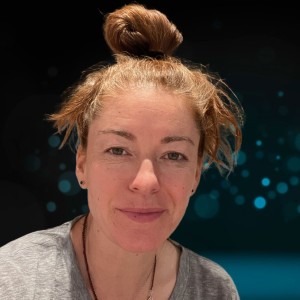
Tuesday Nov 01, 2022
Chatter Marks EP 049 On roots, family and heritage with Priscilla Hensley
Tuesday Nov 01, 2022
Tuesday Nov 01, 2022
Priscilla Hensley is a writer and a documentarian. Before she started working on documentaries, her job history was varied — she had worked in communications and, having made a few short films herself, had some prior knowledge of filmmaking. There was also a period of time when she considered herself a poet. All these jobs have helped her to become a jack-of-all-trades. Her time in communications has helped a lot with her documentary work because so much of filmmaking is about logistics and making things happen. Her poetry has helped with her screenwriting. She says that the most important thing she’s learned about screenwriting is to start. Just put the story on paper. You don’t need to have great spelling, you can drop words, and you don’t need to storyboard everything. Just start writing. And then, later, you can worry about editing and rewriting.
Priscilla grew up recognizing and honoring her Inupiaq heritage. Her dad, William Hensley, is a key figure in Alaska Native land rights. He’s known for his role in the creation of the Alaska Native Claims Settlement Act. As a result of the act, Alaska Natives retained 44 million acres of land and about 1 billion dollars to settle Indigenous land claims in Alaska. Growing up around all of this is a big reason she pursues telling the stories that she does. The first documentary she worked on, for example, was “We Up,” a film about Indigenous hip hop of the circumpolar North. It was produced by the Anchorage Museum. In addition to it being a family affair — her husband also worked on the film and their children tagged along — it introduced her to the power of filmmaking.
Priscilla has tattoos that commemorate her roots and her heritage. She gets them with her cousin every time she goes back to Alaska. The most recent one is on her hand, so she sees it when she’s writing or operating a camera. She says that she loves seeing her tattoos when she works because they’re a visual reminder of who she is, how she wants the world to see her, and her responsibility to being true to herself, her family and her community.
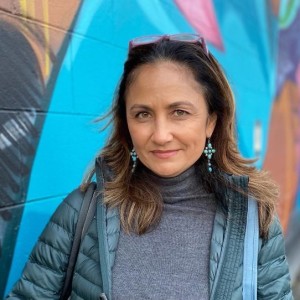
Sunday Oct 23, 2022
Sunday Oct 23, 2022
Melissa Chimera creates mixed media paintings and installations that are research-based investigations into species extinction, globalization and human migration. Her portraits are fictional, but they’re based in empirical fact. She combs through the public record of peoples’ lives, collecting information to better understand them beyond what DNA can tell us. She includes elements and details of what she finds into her paintings. She says that the Philippines are a confluence of so many tragedies. Politically, economically and environmentally. There’s really no work for the people who aren’t middle class. So they move, they immigrate for opportunity and to send money back to their family. This is the story that Melissa is telling, the one she’s trying to better understand. As a descendant of Filipino and Lebanese immigrants herself, it’s a personal one.
She’s currently in-residence at the Anchorage Museum, exploring the Filipino diaspora through research and interviews. To help make sense of all this information, she’s putting two podcasts together. “Drift: Immigration and Identity in America” is an interview series, and “Land and People” looks at practitioners and people with ancestral ties to the land. There’s also a component of cataloging what the land looks like right now for future reference. She says that as she’s interviewing people they’re also unpacking the psychology of internalized racism and what that looks like and what it feels like. It’s complicated because there are so many facets to this project — there’s immigration, there’s the socioeconomic issues, the cost of living and it’s all under the umbrella of capitalism.
Photo courtesy of Josh Branstetter
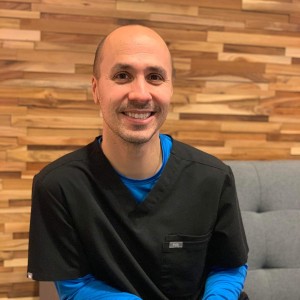
Sunday Oct 16, 2022
Sunday Oct 16, 2022
In this one, Cody talks to Pete Iversen. Pete’s a dentist now, but back in the late 1990s, he was on his way to becoming a top name in snowboarding — he was winning heavy competitions and he was filming with big snowboard videos and local ones too. He had shots in a Mack Dawg video and a Straight Jacket Films video and parts in the legendary JB Deuce videos. Things were looking pretty good, until two separate knee injuries took him out. He says he just took too many flat landings, and after the second knee injury he found himself reconsidering being part of the snowboard industry. Not only was he questioning the strength of his own body, he had a tumultuous relationship with his sponsor, Ride Snowboards. In his final years of pursuing snowboarding as a career, he struggled with the ‘Why’ of it. Why does he do it? Is it just to look cool? Or is it for other selfish reasons? Because that’s not the type of person Pete wanted to be. He wanted to help people. So, he got out.
After he left snowboarding, he went through a rough patch of aimlessness and video game addiction. During the day, he worked in landscaping. After work, he would sometimes play eight hours of video games, getting no sleep for work the next day. This cycle repeated itself for over a year, until he made the decision to go to school for dentistry after a suggestion from his sister. This was his opportunity to make a difference in peoples’ lives. Now, instead of worrying about sponsorship obligations and injuries, he’s focused on being a good husband, father and entrepreneur. Mostly, he looks back on his snowboarding days with fondness — he’s most proud of the friendships he built along the way. But thinking about his life and the work he does now as a dentist, he sees it as his legacy, evidence of all the hard work he’s put into his life.
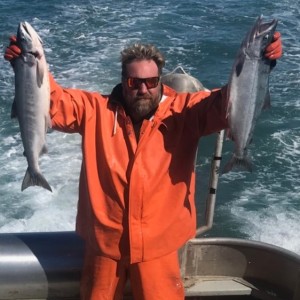
Friday Oct 07, 2022
EP 116 After 36 Crazyfists with Brock Lindow
Friday Oct 07, 2022
Friday Oct 07, 2022
In this one, Cody talks to Brock Lindow of 36 Crazyfists. For 25 years, he was the vocalist of the band and, along with his bandmates, he wrote albums and performed songs, toured, connected with people at shows on a nightly basis and then repeated the cycle. He was 18 years old when 36 started — a founding member — and at that age, young bravado and vitality helped them be, as Brock puts it, a band of the people. They partied with fans before and after shows. They moved to Seattle, then to Portland, to pursue a dream of being rockstars. And they did it, they were rockstars. Kids from Alaska playing their music all over the United States, Europe and South Africa. Fans knew their lyrics, asked for autographs. And Brock appreciated all of it, but he never got comfortable with it. Fame just wasn’t for him and he always longed for being back in Alaska, hanging out with his friends and commercial fishing with his dad.
He’s 47 now and he doesn’t miss being on the road, driving endlessly from venue to venue. He prefers being with his family, hanging out with his friends, co-hosting the Bob and Brock Show on KWHL, and being his daughter’s biggest fan at her hockey games. He says he’s still learning how to manage his energy and his enthusiasm at her games though — sometimes it can be tough separating himself from his rockstar days to being the role model he needs to be for his family, but it’s essential. And he hasn’t given up on music, he probably never will. It tends to show up when he needs it most. Like during COVID, when everyone was navigating all of the uncertainty, he connected with a few old friends and a few new ones to form a new band called Paradise Slaves.
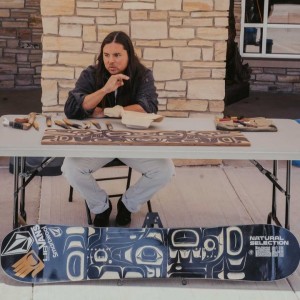
Friday Sep 30, 2022
EP 115 Tlingit knowledge and art with James Johnson
Friday Sep 30, 2022
Friday Sep 30, 2022
In this one, Cody talks to Tlingit artist James Johnson. Before he got to the level he’s at now, James taught himself the fundamentals of the Tlingit artform — he taught himself how to draw, how to carve, how to sharpen his knives. He taught himself the fundamentals of formline. His dad taught him the importance of traditional knowledge — that when you create a piece, you create it for your clan. Be it a paddle, a bowl, a bentwood box, a mask, a rattle, a totem pole. He says that in the old days, once the carvers were finished with a totem pole — once it was raised — they could no longer touch it because now it belonged to the people. James’ dad told him that when he finishes a piece, to let it go and, like a balloon in the sky, that piece will go where it needs to go. The main thing is to focus on skill and that your skill is going to improve with every piece you do.
Everything that he’s doing right now — whether it’s talking to an auditorium of 500 people or hosting a workshop for youth or working on a commission for Google — it’s bigger than him. It’s for his ancestors, for his culture and his traditions. It’s a reminder of the destruction and human toll of colonialism. It’s more than creating a beautiful piece. It’s about understanding history and sharing Tlingit knowledge. He does it for his clan, for his family and for his contemporaries — all of the other northwest coast artists striving to reach the golden age of their artform that occurred in the 1700s and early 1800s, after steel was introduced to their culture during the fur trade.
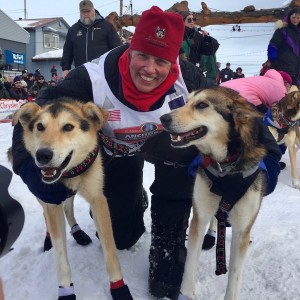
Saturday Sep 24, 2022
EP 114 Life after dog mushing with Aliy Zirkle
Saturday Sep 24, 2022
Saturday Sep 24, 2022
In this one, Cody talks to dog musher Aliy Zirkle. She’s always felt a strong connection to animals, dogs in particular. She tells this story about how when she was a kid and lived in Puerto Rico, there were a couple of stray dogs that pulled her around on a skateboard. Mushing was in her blood, even then.
For 30 years, mushing has been everything to Aliy. It’s been her passion and her career. And understanding her dog’s abilities and their limits has been key because if you break that — if you break their trust or you ask them to do too much — then they lose confidence in you as their leader. So, Aliy made sure she knew every one of her dogs — their individual personalities, their eccentricities and their limits. Skunk, Commando, Mismo, Mac, Pedro, Rubia, Beemer, Viper, Quito, just to name a few. She knew and knows all of them. They’ve taught her indispensable truths, like how to live in the moment and how to appreciate the present because that’s all we really have.
In 2021, she raced her last Iditarod. It didn’t turn out the way she anticipated. Her plan was to win — to be the first racer to pass under the Burled Arch — but about 200 miles into the race, she crashed, hit the back of her head on the ice and was dragged by her arm for an indeterminate amount of time. She had to be airlifted to the hospital, where she found out that she had suffered a concussion, something that she’s still recovering from.
As a musher, she has relied on her toughness — her ability to get through difficulties out on the trail on her own. That it’s her and the dogs — Team Zirkle, the fan favorite — out there in the Alaska wilderness. The team that always finishes the race. That’s been her biggest struggle throughout all of this — that she didn’t finish her last race. It weighs so heavily on her sometimes that it’s best just not to think about it. She says that the whole situation still seems a little surreal and that she’s still trying to make sense of it.
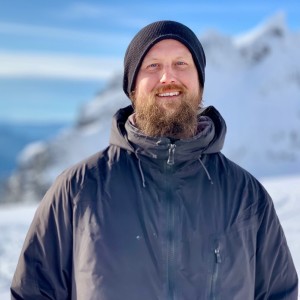
Friday Sep 16, 2022
EP 113 Filming and soul searching with Gary Milton
Friday Sep 16, 2022
Friday Sep 16, 2022
In this one, Cody talks to videographer Gary Milton. He describes himself as a snowboarder, through and through — one who, every year, has a best day ever. A day spent with old friends and new friends and riding powder. It’s reminiscent of his upbringing in Palmer, Alaska, where he and his buddies would explore the surrounding woods and mountains. They’d snowboard 16 mile and, for their age and their ability, it was filled with huge and intimidating jumps that had names like “The Beast,” and “Endless.” One was a big boulder and the other was basically a 20-ft step-down jump. The walls in his bedroom became proof of his love for snowboarding. It was plastered with posters and covers ripped from snowboard magazines. Years later, when he started filming for the TransWorld SNOWboarding video, he walked into their office in California and saw so many of the same photos he had on his walls as a kid. It was a surreal moment that felt like he had somehow manifested a childhood dream.
For 10 years, Gary helped film snowboard videos for Think Thank, TransWorld SNOWboarding and Videograss. It was all-consuming. Every year there’d be six months of filming — with chances to go home for maybe four days a month, if he was lucky. Then there’d be one or two months dedicated to editing. And then it was premier season. It was exhausting and rewarding, but he ultimately got burned out and moved on to film a hunting show called Team Elk for five years.
He eventually decided to get into therapy because he didn’t like where his personal life was heading. There was just too much drinking and bad decision-making going on. He wanted to understand and overcome his childhood trauma and end those patterns of abuse. To re-establish himself as reliable, thoughtful and caring. Someone his wife and daughter could rely on at any time of the day. And that’s exactly what he did.





